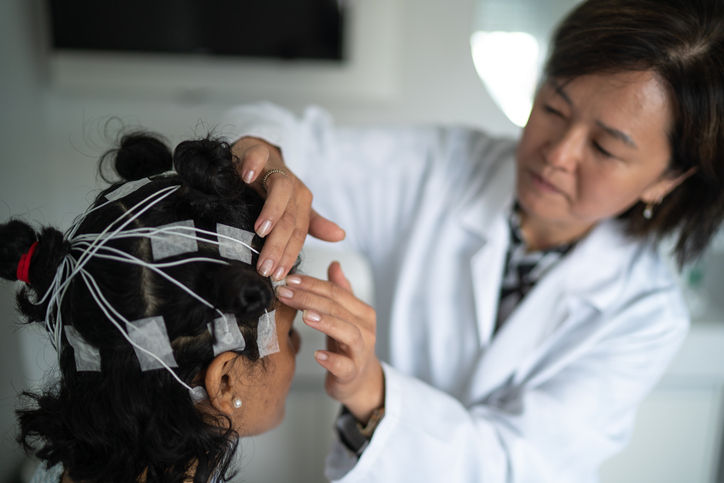Epilepsy ranks as the second most prevalent neurological disorder in the U.S., affecting over three million Americans, second only to stroke. This chronic ailment is characterized by recurring spontaneous seizures, triggered by various underlying factors.
Epilepsy is classified into several different types, and the treatment may vary depending on the classification and cause of a patient’s seizures.
The Comprehensive Epilepsy Center provides compassionate care for the adult epilepsy patient population in Northern New Jersey. Patients at our Morristown, Overlook, Chilton, Hackettstown, and Newton medical center locations are seamlessly connected to the expertise of Atlantic Health System’s Neuroscience Institute.
A Multidisciplinary Approach
We have assembled a multidisciplinary team of experts who provide specialized care for epilepsy patients. Patients will be seen in the Epilepsy Center clinic, and may also be seen in the inpatient epilepsy monitoring unit as an inpatient, which is staffed by a team of specialty-trained nurses and EEG technologists.
Overlook and Morristown medical centers have been designated by the National Association of Epilepsy Centers (NAEC) as Level IV comprehensive epilepsy centers, which means that our patients have access to the highest level of epilepsy care. Patients are able to receive a complete evaluation for their seizures, with treatment options that can include epilepsy surgery or implantable device therapies.
Our multidisciplinary team includes:
- Neurologists specializing in epilepsy
- Neurosurgeons
- Neuropsychologists
- Nurse practitioners and physician assistants
- Nurses with epilepsy training
- EEG technologists
- Neuroradiologists
- Physical therapists
- Social worker
- Experienced patient advocacy group
Pediatric Epilepsy Monitoring

Pediatric Epilepsy Monitoring
Although an epilepsy diagnosis can be made at any age, most patients develop symptoms as adolescents between the ages of 13 and 16. For that reason, we offer pediatric epilepsy monitoring at Goryeb Children’s Hospital's Division of Child Neurology and Developmental Medicine. Our epilepsy specialists collaborate with pediatric neurosurgeons, epilepsy specialists, and other pediatric subspecialists to tailor a treatment plan that’s best for the child. Once these patients reach adulthood, their care is seamlessly transferred to our Comprehensive Epilepsy Center.
Locations

Epilepsy Monitoring Unit for Evaluation of Seizures
The epilepsy monitoring unit (EMU) evaluates seizures to help guide future management of your seizures. Patients are typically admitted on Monday morning and are discharged three to five days later. Learn what an EMU is for and how to prepare for one if prescribed by your physician.
Types of epilepsy and seizures treated
- Absence epilepsy
- Benign epilepsy
- Catamenial epilepsy
- Clonic seizure
- Complex epilepsy
- Drop attack
- Dravet syndrome
- Febrile seizure
- Focal epilepsy
- Focal motor seizure
- Generalized epilepsy
- Grand mal epilepsy
- Intractable epilepsy
- Lennox Gastaut syndrome
- Mal seizure
- Mitochondrial disorders
- Myoclonic epilepsy
- Nocturnal epilepsy
- Partial epilepsy
- Partial focal seizure
- Petit mal epilepsy
- Refractory epilepsy
- Rett syndrome
- Rolandic epilepsy
- Sleep epilepsy
- Tonic clonic seizure
- West syndrome
Request More Information
Please use the form to request more information.
All fields are required.
Please note that this form is for North American residents only.


